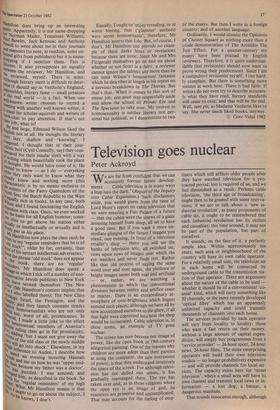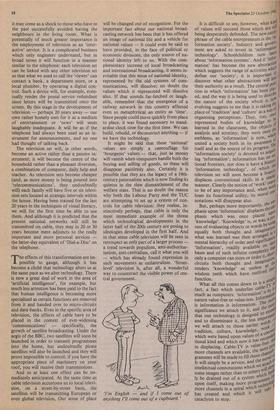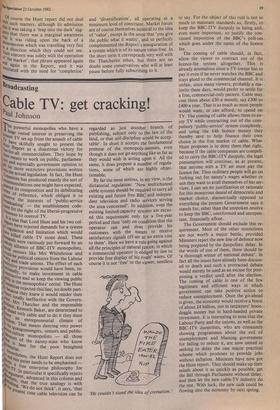Television goes nuclear
Peter Ackroyd
'We are far from confident that we can accurately foresee future develop- ments ... Cable television is in many ways a leap into the dark.' (Report of the Inquiry into Cable Expansion.) Such disclaimers aside, you would guess from the tone of Lord Hunt's report on cable television that we were entering a Fun Palace of a future — that the cables were the sinews of a giant arousing himself from sleep, all set to have a good time. But if you want a more im- mediate glimpse of the future I suggest you stand, one evening, in front of a television retailer's shop — there you will see the banks of television sets, all switched on, rows upon rows of images over which the eye wanders and never finds rest. Rather like that old process of saying the same word over and over again, the plethora of bright images seems both real and artificial — or, rather, we are watching a phenomenon in which the conventional divisions between reality and artifice cease to matter. There is an extraordinary at- mosphere of over-brightness which lingers around such places; although we have all by now accustomed ourselves to the glare, if all that light were converted into heat the shop would be incinerated. Cable television is, in these terms, an example of TV gone nuclear. The screen has now become our image of power, like the open book in 19th-century allegorical painting. One of the reasons why children are more adept than their parents at using the computer, the new instrument of power, is that they understand intuitively the space of the screen. For although televi- sion has not dulled our senses, it has gradually rearranged them. The eye has taken over and, as in those religions where the open eye is an image of god, its resources are. primitive and uncomplicated. That may account for the feeling of emp-
tiness which still afflicts older people after they have watched television for a pro- tracted period: less is required of us, and we feel diminished as a result. Perhaps cable television, 'the third age of broadcasting', ought then to be greeted with some reserva- tions; if we are to talk about a 'new in- dustrial revolution', as many proponents of cable do, it ought to be remembered that each industrial revolution has its victims and casualties: this time around, it may not be part of the population, but part of ourselves.
It sounds, on the face of it, a perfectly simple idea. Within approximately ten years, each area or neighbourhood of the country will have its own cable operator. For a relatively small sum, the television set in each home will be connected by underground cable to the transmission sta- tion of that operator. There are arguments about the nature of the cable to be used whether it should be of a conventional 'co- axial' kind, which will carry something like 30 channels, or the more recently developed 'optical fibre' which has an apparently- unlimited capacity and could transmit thousands of channels into each home.
The services provided by each operator will vary from locality to locality: those who want a fast return on their money, without a large amount of capital expen- diture, will simply buy programmes from a 'service provider' — 24-hour sport, 24-hour news, 24-hour films. The more enterprising operators will build their own television studios — no longer prohibitively expensive — and will provide channels for local ser- vices. The capacity exists here for 'street television', where a small area will have its own channel and transmit local news or in- formation — a lost dog, a bazaar, a dangerous manhole.
That sounds innocuous enough, although
it may come as a shock to those who have in the past successfully avoided having the neighbours in the living room. What is potentially of much greater importance is the employment of television as an 'inter- active' service. It is a complicated business which only engineers understand, but in broad terms it will function in a manner similar to the telephone: each television set can be linked with any other television set so that what we used to call the 'viewer' can contact a bank, a department store, or a local plumber, by operating a digital con- trol. Such a device will, for example, even- tually render the postal service redundant since letters will be transmitted onto the screen. By this stage in the development of television — perhaps 20 years away — our own rather homely uses for it as a medium of entertainment or 'news' will seem laughably inadequate. It will be as if the telephone had always been used as an in- strument for announcements, and no one had thought of talking back.
The television set will, in other words, become an active rather than a passive in- strument; it will become the centre of the household rather than a pleasant diversion, a combination of computer, daily help and teacher. As television sets become cheaper (and, as more money is being poured into `telecommunications', they undoubtedly will) each family will have five or six televi- sion sets located at strategic intervals within the house. Having been trained for the last 20 years in the techniques of visual literacy, we will for the first time be able to use them. And although it is predicted that the present national networks will still be transmitted on cable, they may in 20 or 30 years become mere adjuncts to the really important and more personal services the latter-day equivalent of 'Dial-a-Disc' on the telephone.
The effects of this transformation are im- possible to gauge, although it has become a cliché that technology alters us at the same pace as we alter technology. There is now a great deal of work in the area of `artificial intelligence', for example, but much less attention has been paid to the fact that human intelligence is becoming more specialised as certain functions are removed from it and handed over to micro-circuits and data-banks. Even in the specific area of television, the effects of cable have to be placed in the context of ever-widening `communications' — specifically, the growth of satellite broadcasting. Under the aegis of the BBC, two satellites will soon be launched in order to transmit programmes into the home, but undoubtedly pirate satellites will also be launched and they will prove impossible to control: if you have the appropriate piece of machinery on your roof, you will receive their transmissions.
And so at least one effect can be im- mediately anticipated. At the same time as cable television accustoms us to local televi- sion, on a street-by-street basis, the satellites will be transmitting European or even global television, Our sense of place will be changed out of recognition. For the important fact about our national broad- casting network has been that it has offered an image of national life and a vehicle for national values — it could even be said to have provided, in the face of political or economic divisions, the only source of na- tional identity left to us. With the com- plementary increase of local broadcasting and international broadcasting, it seems in- evitable that this sense of national identity, represented by the old systems of com- munications, will dissolve; no doubt the values which it represented will dissolve also. If that sounds far-fetched or laugh- able, remember that the emergence of a railway network in this country affected even so metaphysical an entity as `time'. Since people could move quickly from place to place, it was found necessary to stand- ardise clock time for the first time. We can build, rebuild, or deconstruct anything — if we have the technology.
It might be said that these 'national' values are simply a camouflage for `bourgeois' values — that, just as money will vanish when computers handle both the buying and selling of goods, so these will disappear painlessly also. Certainly it is possible that they are the legacy of a 19th- century paternalism which is now finding its quietus in the slow dismantlement of the welfare state. That is no doubt the reason why both the Labour Party and the TUC are attempting to set up a system of con- trols for cable television: they realise, in- stinctively perhaps, that cable is only the most immediate example of the threat which technological developments in the latter half of the 20th century are posing to ideologies developed in the first half. And in that sense cable television will be seen in retrospect as only part of a larger process a trend towards populism, anti-authoritar- ianism, anti-centralism, call it what you will — which has already found expression in such movements as unilateralism. 'Street- level' television is, after all, a wonderful way to counteract the visible power of cen- tral government.
'I'm English — and if I come out of anything I'll come out of a cupboard.' The Spectator 23 October 1982 It is difficult to see, however, what kind of values will succeed those which are still being desperately defended. The new catch• phrase of the cable entrepreneurs is the `ill" formation society'. Industry and govern" ment are asked to invest in `information technology'. Schoolchildren now learn about 'information systems'. And if `inf°[• mation' has become the new abstraction which suggests the range of activities which define our 'society', it is important t° discover what other abstractions will 105 their authority as a result. The central Pr tion in which 'information' has been Pc. ed, and the way it is being used to describe the nature of the society which is rite evolving suggests to me that it is taking h'i place of 'tradition' and 'culture' as a waY organising perceptions. They, too, on' represented bodies of knowledge to 11 learned in the classroom, the objects °. analysis and scrutiny; they were once emblems, as `information' is now, Whici. united a society both in its awareness he itself and as the source of its progress. The `information society' is devoted to ago°. ing 'information'; information has no n°. tional frontiers, nor does it have a history e. `Information technology', of which television set will soon become a brahlor displaces conventional skills in a sirfn,, manner. Clearly the notion of 'work' eer) to be of any importance and, when w°„, loses its functional utility, its moral cc.
notations will disappear also. ern' But, perhaps more importantly, the phasis upon 'information' displaces the' phasis which was once placed tir `knowledge'. `Knowledge' is, or was, a PA/iso, cess of evaluating objects or words by i,'0'0; equally both thought and imagin,a1.108 what was learned was then arranged 1 cc, mental hierarchy of order and significlato `Information', readily available on that bases and of such infinite complexitY,.'ort, only a computer can store or order it, sn.00, circuits both thought and imaginatIthe renders 'knowledge' as useless as their wisdom What all which have outlived IP hat all this comes down tois a sly *de as fact, a fact which underlies cable-Tby its much as computers: 'information' is atioo nature value-free or value-less. laMliiniore is information is information. The re significance we attach to it, and the "end that our technology is designed to awe and to disseminate it, the less iiriF°rAs we will attach to those earlier works tradition, culture, knowledge, W°I.iiverr which were based upon values of a °°„ejerl tional kind and which now it has suceee. the in displacing. Cable-TV is value-free' more channels are available, the incliriels. grammes will be made to fill those Chan It will simply be a service, and the to intellectual connotations which we att6,4, some images rather than to others will sficedsu ly be drained out of a system which jot] upon itself, making more prograanii!osiogy cataclysm ar ce lc ycr she maa tnetndoe ss atoinnpd.a swphiricalhwihtichwitieci riti;_ike I .0f course the Hunt report did not deal with such matters, although its admission that it was taking a 'leap into the dark' sug- Bests that there was a marginal awareness Flat it wasriding upon the back of a phenomenon which was travelling very fast a direction which they could not see. Their concern was solely with the operation the market'; that phrase appeared again again in the Report, and it was n'snciated with the need for 'completion'
and 'diversification', all operating at a minimum level of constraint. Market forces are of course themselves inimical to the idea of 'value', except in the sense that 'you give the public what it wants', and so perfectly complemented the Report's inauguration of a system which is of its nature value-free. In the short term it corresponds very well with the Thatcherite ethos, but there are no doubt some conservatives who will at least pause before fully subscribing to it.












































 Previous page
Previous page